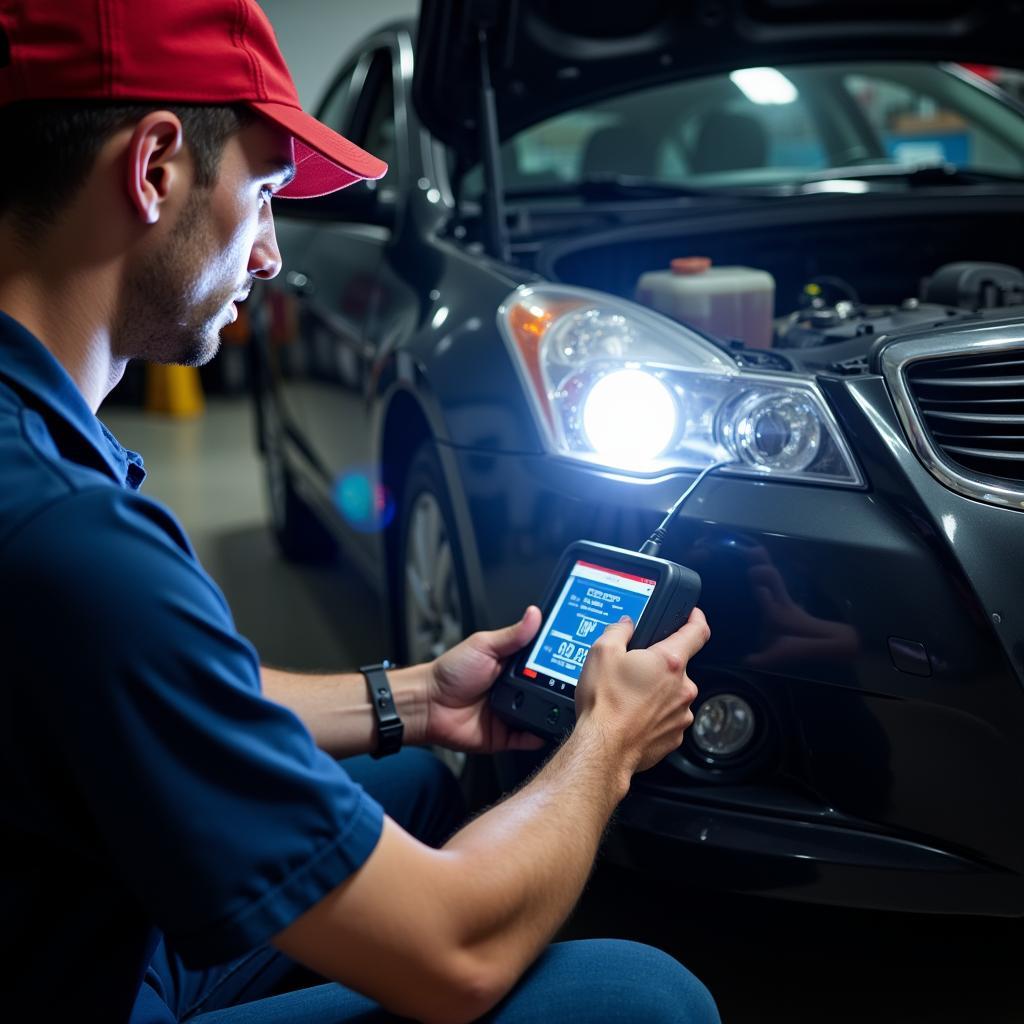A diagnostic scan on a car is like a health checkup for your vehicle’s computer system. It’s a process that involves plugging a specialized tool, called a car diagnostic scanner, into your car’s OBD-II port (On-Board Diagnostics). This port acts as the gateway to your car’s computer, allowing the scanner to communicate with it and retrieve valuable information.
 Car Diagnostic Scan Process
Car Diagnostic Scan Process
Decoding Your Car’s Language: How Diagnostic Scans Work
Imagine your car trying to tell you there’s a problem, but it only speaks in complex codes. That’s where the diagnostic scan comes in. It acts as a translator, deciphering these codes and presenting them in a readable format for mechanics and car owners.
These codes, also known as Diagnostic Trouble Codes (DTCs), are triggered when your car’s sensors detect an issue within various systems like the engine, transmission, emissions, or even safety features like airbags. Each code corresponds to a specific problem, helping pinpoint the root cause of the issue.
Why Diagnostic Scans are Crucial for Your Car’s Wellbeing
Diagnostic scans have become an indispensable tool in modern car maintenance and repair for several reasons:
- Early Detection and Prevention: Think of it like catching a health issue early on. Diagnostic scans can detect problems before they escalate into major (and expensive) repairs.
- Accurate Diagnosis: Gone are the days of guesswork in car repair. Diagnostic scans provide precise information, eliminating unnecessary repairs and saving you time and money.
- Improved Performance: By identifying issues affecting your car’s performance, such as reduced fuel efficiency or engine misfires, diagnostic scans can help restore your vehicle to its optimal running condition.
- Safety First: Diagnostic scans can identify issues related to safety-critical systems like brakes, airbags, or stability control, ensuring your car is safe to drive.
- Transparency and Trust: For car owners, understanding the ‘what’ and ‘why’ behind a repair builds trust. Diagnostic scans provide transparency into your car’s health, empowering you to make informed decisions.
what is i m on a car diagnostic scanner
Beyond the Basics: What Can a Diagnostic Scan Detect?
While the specifics can vary depending on the scanner and your car’s make and model, diagnostic scans can generally detect a wide range of issues, including:
- Engine Problems: Misfires, fuel system issues, oxygen sensor malfunctions, and more.
- Transmission Issues: Slipping gears, faulty solenoids, and other transmission-related problems.
- Emissions System: Problems with the catalytic converter, evaporative emissions system, and other emissions-related components.
- Brake System: ABS issues, brake fluid level, and other brake-related concerns.
- Airbag System: Malfunctioning sensors, deployment issues, and other airbag-related problems.
- Steering and Suspension: Issues with power steering, alignment, and suspension components.
can a diagnostic scan detect car really mileage
When Does Your Car Need a Diagnostic Scan?
- Check Engine Light: This is the most obvious sign. If your check engine light is on, a diagnostic scan is crucial to understanding the problem.
- Unusual Noises or Smells: Any strange noises from the engine, unusual vibrations, or burning smells warrant a diagnostic check.
- Performance Issues: Noticeable changes in your car’s performance, such as reduced fuel economy, sluggish acceleration, or difficulty starting, are all reasons to consider a diagnostic scan.
- After an Accident: Even a minor accident can trigger error codes or hidden issues, making a diagnostic scan a vital step after any collision.
- Regular Maintenance: Just like regular health checkups, periodic diagnostic scans can help identify potential problems early on, preventing costly repairs down the road.
what car diagnostic scanner should i buy
Conclusion: Empowering Car Owners with Diagnostic Knowledge
Understanding what a diagnostic scan is and its importance can be empowering for car owners. It allows you to approach car repairs with knowledge, ask the right questions, and ensure you’re getting the best possible care for your vehicle. Whether you’re experiencing car trouble or want to stay ahead of potential issues, a diagnostic scan is a valuable tool for maintaining your car’s health and your peace of mind.
wifi obd2 car diagnostic scanner
FAQs:
1. How much does a car diagnostic scan cost?
The cost can vary significantly depending on your location, the mechanic, and the complexity of the issue. However, it’s generally a worthwhile investment considering the potential savings from accurate diagnosis and avoiding unnecessary repairs.
2. Can I perform a car diagnostic scan myself?
Yes, affordable OBD-II scanners are available for DIY car owners. While they may not offer the same depth of information as professional-grade scanners, they can provide basic insights into your car’s health.
3. What should I do if the diagnostic scan doesn’t reveal any problems?
While diagnostic scans are highly effective, they may not always identify every issue. If you’re experiencing persistent problems despite a clean scan, seeking a specialized mechanic with expertise in your car’s make and model is recommended.
4. Are there any risks associated with car diagnostic scans?
Diagnostic scans themselves pose no risk to your car. They are a non-invasive way to communicate with your car’s computer and retrieve information.
5. Can a diagnostic scan tell me the remaining life of car parts?
While diagnostic scans can’t predict the exact lifespan of car parts, they can identify issues that might indicate a part is nearing the end of its life, allowing for timely replacement and preventing unexpected breakdowns.

Leave a Reply